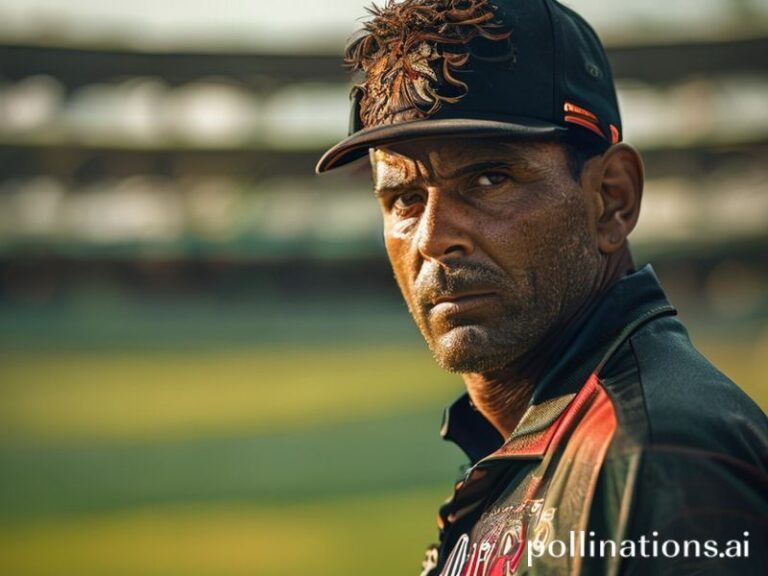Rugby: The World’s Most Polite Blood-Sport and Accidental Diplomat
Rugby: The World’s Most Polite Blood-Sport
By Dave’s Locker International Desk
If there is a single pursuit that proves human beings will ritualise anything short of nuclear war, it is rugby: a game invented when an English schoolboy allegedly picked up a football in 1823 and thought, “Let’s add concussions.” Two centuries later, that boyish impulse has metastasised into a planetary pageant of mud, money and mild colonial hangover. From the windswept paddocks of Otago to the air-conditioned malls of Dubai, rugby now serves as both geopolitical comfort blanket and quarterly earnings report—proof that if you hit people hard enough, no one asks who originally owned the pasture.
Consider the southern hemisphere’s annual pantomime, the Rugby Championship. Every August, four nations who once measured their worth by how many British ships they could sink instead measure it by how many British-descended referees they can berate. Argentina—whose introduction to the tournament was greeted with the same enthusiasm one shows an in-law at Christmas—has gamely turned its pack into a national therapy session for 1970s disappearances. Lose by 50 to the All Blacks, and at least the generals aren’t in charge. Win, and inflation briefly drops a decimal point.
Up north, the Six Nations behaves like an EU summit played in short shorts. France arrives late but stylish; Italy arrives on time but forgets the ball; Scotland arrives sober, which everyone agrees is suspicious. The tournament’s enduring miracle is that it keeps the British Isles from actually invading one another—an achievement the United Nations has yet to replicate despite a larger budget and fewer scrums. When Wales sings “Hen Wlad Fy Nhadau,” even the most hardened Brexiteer remembers that sovereignty is negotiable if someone hands you a leek and a ticket to Cardiff.
Meanwhile, in the Pacific, rugby is less sport than diaspora life-insurance policy. Samoa, Tonga and Fiji export eight-stone teenagers who return as 18-stone regrets, their joints held together by prayer and the NRL’s collective bargaining agreement. New Zealand—ever the conscientious coloniser—politely harvests this talent, then expresses shock when Auckland’s Pasifika community asks for clean drinking water. The All Blacks’ haka, once a war dance, is now a trademarked revenue stream; nothing says cultural respect like a royalty fee.
Japan’s 2019 World Cup was supposed to be rugby’s gentle coming-out party in Asia—Cherry blossoms, Disney queues, immaculate toilets. Instead it delivered a typhoon, cancelled matches, and Scotland threatening litigation with the indignation of a man whose umbrella has turned inside out. The hosts, however, stunned Ireland and Samoa, proving you can indeed tackle someone into next week while still bowing apologetically. Tokyo’s Shibuya Crossing briefly replaced scrum caps with surgical masks, and the sport gained 20 million new fans who now think a ruck is a type of cryptocurrency.
Which brings us to money. World Rugby, the governing body headquartered beside a coffee shop in Dublin that pretends not to be a tax haven, recently floated the idea of a Nations League—essentially the Champions League but with more cauliflower ears. The proposal would lock the Pacific Islands out of the top tier, prompting Fiji’s coach to ask whether colonialism had simply changed its postcode. Negotiations continue, presumably over flat whites and existential dread.
Yet for all the corporate gloss, rugby remains endearingly medieval. There is no salary cap on torn ligaments, and no VAR for shattered cheekbones. Players still shake hands after 80 minutes of attempted decapitation, a courtesy not extended in most parliaments. Spectators, lubricated by fermented nationalism, treat every penalty like a personal betrayal, then queue politely for the ferry home.
In the end, rugby is what happens when you give nations padding, instructions not to kill one another, and a scoreboard. It is both catharsis and calendar event, a way to export testosterone without aircraft carriers. The world may be burning, supply chains dissolving, and democracies rebooting in safe mode, but somewhere a whistle will blow this weekend, 30 people will shove each other for an egg-shaped ball, and for 80 minutes the planet will pretend that structured violence is the same as progress.
And when the final whistle goes, we’ll all shake hands—because that’s the civilised thing to do after you’ve spent an afternoon trying to separate someone’s shoulder from their sense of identity.







